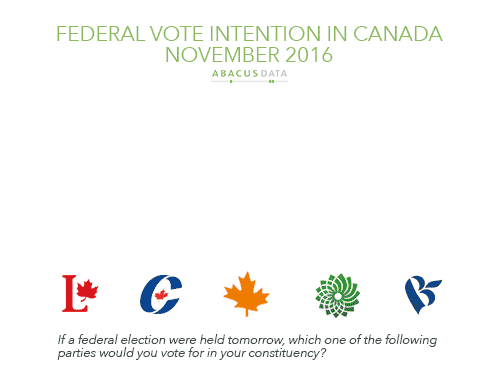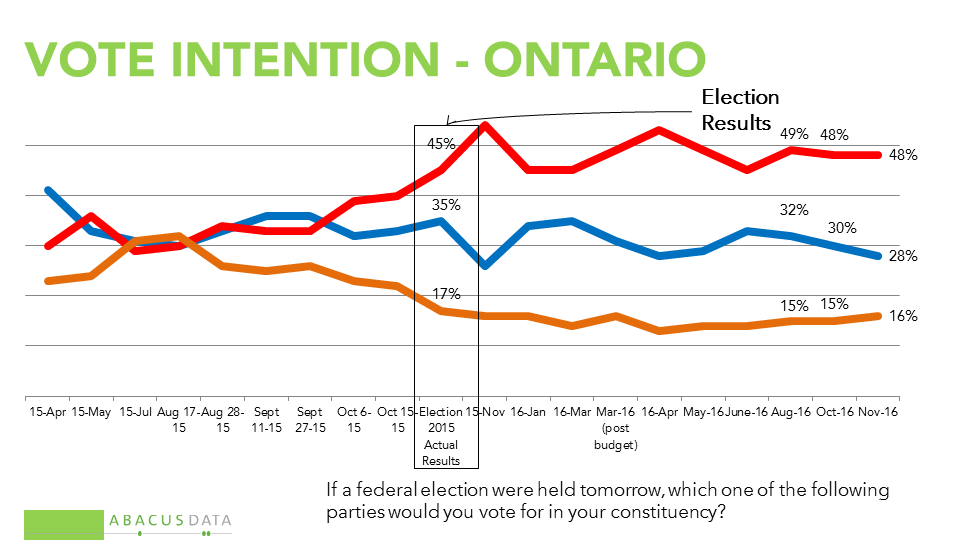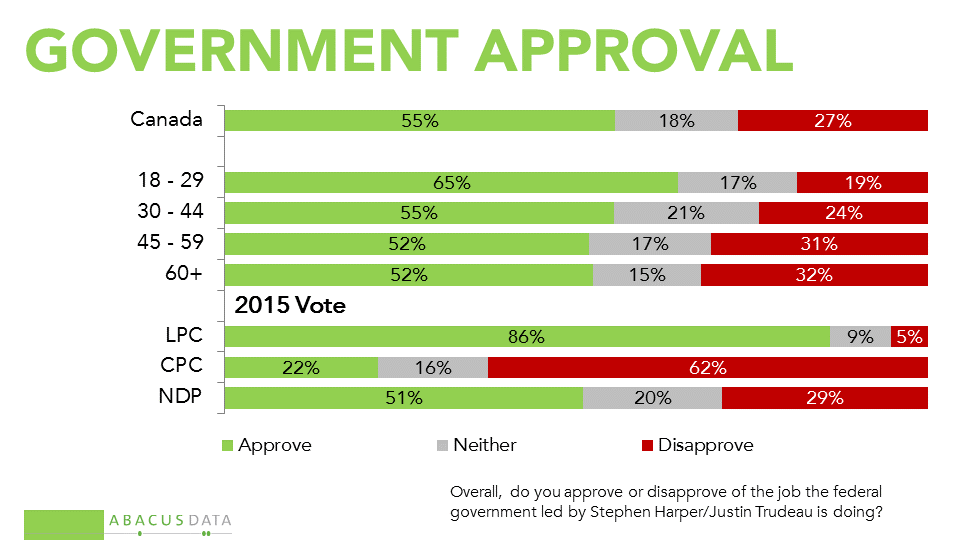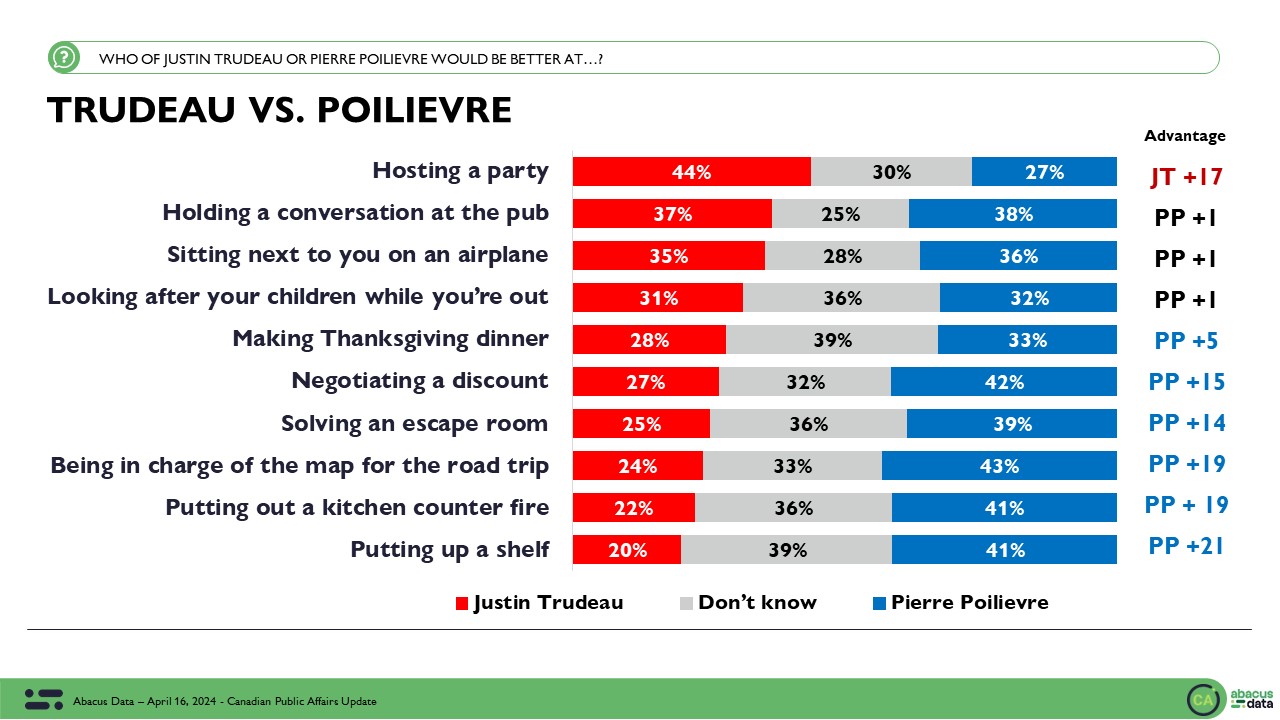Broad support continues for the Trudeau government
November 14, 2016

In our latest survey of national opinion, we explored views of Canadian politics, perceptions of the federal government, the PM and other leaders, the aftermath of the US election and attitudes towards oil development in Canada, among other topics.
In this our first release, we look at the domestic political context in Canada.
• In an election held right now, the Liberal Party would attract support from 46%, compared to 25% for the Conservative Party and 17% for the NDP. These numbers show little change of late. While the changes are slight, the numbers suggest a possible softening of Conservative Party support as their leadership race gathers some pace. This is more noticeable in Ontario and BC.

• In Ontario, the Liberals have a 20-point lead, and are up 3 points from their Election Day result. The Conservatives are 7 points below their result last fall. In Quebec, the Liberals have a 27-point lead and are 10 points higher than their election result. The NDP have dropped 6 points over the year and the Conservatives have lost 5. In BC, the Liberals lead by 25, and are 11 points ahead of their result last fall. The Conservatives are 9 points lower than they were last Election Day, and the NDP are 6 points lower. In Atlantic Canada, the Liberals lead by 39 points. In Alberta, they trail the Conservatives by 24 points.
• The Liberals lead among both men (by 16 points) and women (by 26 points). They also lead among all age groups, with their biggest advantage being among voters under 30.




• By a margin of 2:1 Canadians approve of the job the Trudeau government is doing. The current approval rating is 23 points higher than the last approval measurement for the Harper government.
• Approval is more common than disapproval in every region of the country, except Alberta. Our sample size in Saskatchewan is proportionate to population size but too small to allow for reporting the numbers for that province on a stand-alone basis.
• A majority among men and women and across all age groups approve of the performance of the government today. Among Liberal voters, 86% approve of the government’s performance, as do 51% of NDP voters and 22% of Conservative voters.



UPSHOT
A year after the Trudeau government was sworn in, voters continue to feel relatively satisfied with the choice the country made and the way in which the Prime Minister and his government are handling their responsibilities.
According to Bruce Anderson:
“Over the course of the year, the government has been dealing with a range of potentially difficult issues from a soft economy and rising deficits, to a shift in the approach against terrorism and ISIS, to refugees, to pipelines, climate change and carbon pricing, Senate appointments and electoral reform.
The net effect has been no loss of political capital and a slight increase in support. Voters tend to think the government is making mostly the right choices, including one in five of those who voted Conservative last fall, and half of those who voted NDP.
This serves as another reminder that most of what happens week-in-week-out in the hand to hand combat in Ottawa goes unnoticed by most voters. Heated debate often seems to voters to be the normal sound of politics working as it should, rather than events that should command their immediate rapt attention.
For Conservative partisans, these numbers highlight the important choice of rallying their traditional base of older voters versus finding a way to attract support among younger Canadians. As their leadership race unfolds, the positions the Party becomes associated with on diversity and tolerance, on climate change, on Canada’s role in the world, will have a lot to do with whether they can attract the next generation of voter support.”
According to David Coletto:
“For the twelfth continuous month, the Liberal Party leads its opponents across the aisle by a considerable margin. And while the opposition parties lack permanent leaders, we shouldn’t underestimate the breadth and depth of support for the Liberal Party, the Prime Minister, or his government.
Not only does Liberal Party support remain higher than its Election Day performance a year out, but approval for the government remains strong in all regions of the country (even in Alberta where 40% approve), among all age groups, and among men and women. Even across education level, which has become a strong predictor for political support in Canada and other jurisdictions, the Trudeau government is approved by a majority in all education groups – from those with high school or less to those with post-graduate degrees.
Given some of the economic uncertainty surrounding the American election, perceptions about the economy in Canada have held steady, about half describe the economy as very good or good while half feel negatively about it. Among those who currently support the Liberal Party, 69% describe the economy positively while 31% describe it negatively. This confirms that while economic perceptions are drivers for vote intention, they are not completely predictive.”
METHODOLOGY
Our survey was conducted online with 2,200 Canadians aged 18 and over from November 11 to 13, 2016. A random sample of panelists was invited to complete the survey from a large representative panel of over 500,000 Canadians.
The Marketing Research and Intelligence Association policy limits statements about margins of sampling error for most online surveys. The margin of error for a comparable probability-based random sample of 2,200 is +/- 2.1%, 19 times out of 20.
The data were weighted according to census data to ensure that the sample matched Canada’s population according to age, gender, educational attainment, and region. Totals may not add up to 100 due to rounding.
ABACUS DATA INC.
We offer global research capacity with a strong focus on customer service, attention to detail and value-added insight. Our team combines the experience of our Chairman Bruce Anderson, one of Canada’s leading research executives for two decades, with the energy, creativity and research expertise of CEO David Coletto, Ph.D.




